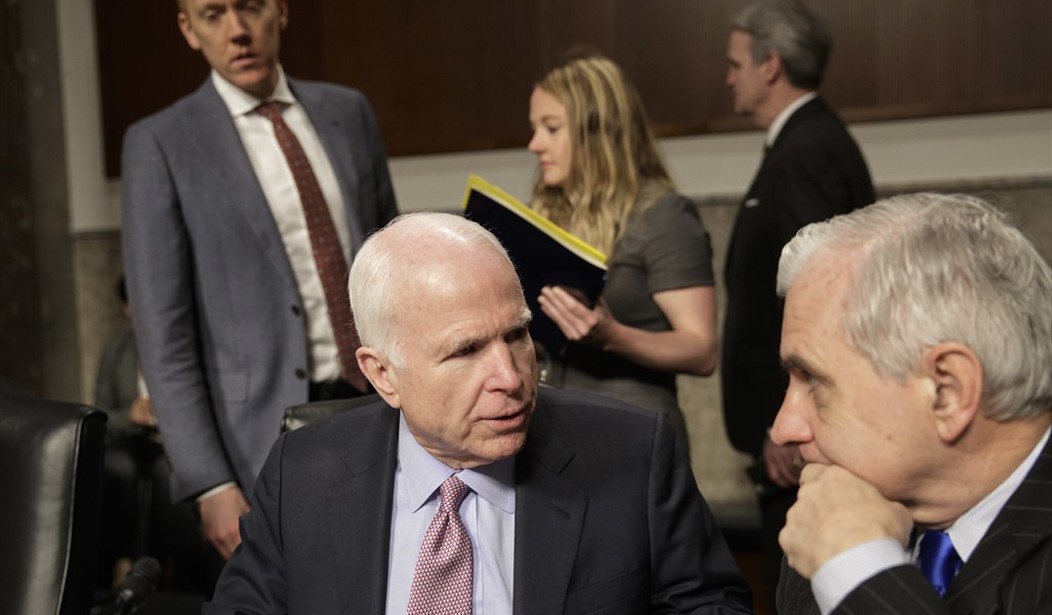Hail, hail, the gang’s all … gone. Twelve years ago, when the issue of Senate filibusters on judicial nominations first became acute, fourteen Senators formed a “gang” to force a compromise between the George W. Bush administration and minority Democrats. John McCain led that effort, much to the chagrin of conservatives at the time.
Don’t expect a repeat performance in 2017. McCain tells Politico that the upper chamber is a different place than it was twelve years earlier, and that no “gangs” will materialize to defuse the coming clash over Neil Gorsuch’s confirmation to the Supreme Court:
Unlike past institutional crises, there’s no bipartisan “gang” stepping up to force a truce between the warring armies led by Mitch McConnell and Chuck Schumer. Acrimony between the two parties has become so routine that invoking the so-called nuclear option to get Neil Gorsuch confirmed to the Supreme Court is almost a ho-hum affair, assumed to be a done deal.
“The Senate has changed,” said Sen. John McCain (R-Ariz.), who’s fought rules changes in the past. “You can’t do what we used to do, what I did in the past. There’s too much ill will.”
“There’s a lot of shared concern about our direction,” added Sen. Chris Coons of Delaware, one of the few Democrats willing to bargain with Republicans to maintain the filibuster. “But there’s not yet a willingness to make any of the actual concessions that would require us to get back to working together in a real way.”
What concessions does Coons have in mind? It’s far from clear what concessions Republicans could make at this point that would bring Democrats back to rational governance, short of agreeing to tube all Supreme Court nominations from Donald Trump. Senate Democrats are essentially arguing to be treated as a majority despite having utterly fumbled a nearly foolproof opening to win control of the upper chamber in November by blocking an obviously qualified candidate from getting a floor vote. Instead, they want to continue throwing a temper tantrum over the blocked nomination of Merrick Garland by Barack Obama, even after voters made it clear that they wanted Republicans to remain in charge of confirmations for the next two years after their invocation of the Biden Rule.
As for the ill will, neither McCain nor Politico mention the real epicenter of the conflict. The opportunities for “gangs” passed away in November 2013 when Harry Reid unilaterally did away with Senate filibusters on presidential nominations, including to the federal bench, an effort that had the complete backing of the Senate Democrat caucus at the time. That was the payback that McCain got for his efforts to retain Senate tradition, and McCain knows it. This statement makes it crystal clear that he’s no longer interested in protecting the shreds of tradition that remain, and that should be a very big red flag to Senate Democrats as they organize a filibuster of Gorsuch. They are on the cusp of destroying whatever leverage Reid left them in his 2013 haste to stack the DC circuit court.
Senate Democrat Claire McCaskill tried explaining that to her party’s donors:
She pointed to the list of potential nominees that Trump released before the election to galvanize conservative support. “By the way, Gorsuch was one of the better ones,” McCaskill quipped.
“So they pick another one off the list and then they bring it over to the Senate and we say no, no, no, this one’s worse. And there’s not enough votes to confirm him. They’re not going to let us do that too long before they move it to 51 votes,” she said. …
“So they move it to 51 votes and they confirm either Gorsuch or they confirm the one after Gorsuch,” she continued. “They go on the Supreme Court and then, God forbid, Ruth Bader Ginsburg dies, or (Anthony) Kennedy retires or (Stephen) Breyer has a stroke or is no longer able to serve. Then we’re not talking about Scalia for Scalia, which is what Gorsuch is, we’re talking about Scalia for somebody on the court who shares our values. And then all of a sudden the things I fought for with scars on my back to show for it in this state are in jeopardy.”
It’s not the only peril Democrats face in this standoff. House Republicans may have bungled their first attempt at being a governing party, but at least they’re trying. Senate Democrats have an opportunity to seize the moment as a mature opposition party, but instead they’re about to make themselves look even worse than their opponents, as I argue today in my column for The Fiscal Times:
While Republicans appear incapable of seizing the moment for governance due to internal divisions, Democrats seem ready to unify in a demonstration of opposition to governance. …
Gorsuch’s opponents have no legitimate reason to block his confirmation other than political disagreement. Our system of government is supposed to function around such matters, however, especially when it comes to presidential appointments. If Democrats refuse to confirm Gorsuch, it will become clear that they will obstruct any nominee they do not choose for themselves. It will be an exercise of the absolutism of the minority – a refusal to cooperate in governance on anything other than the terms of a party that lost the last election and lost it badly.
Republicans may have proven themselves momentarily incompetent at governance over the American Health Care Act, but at least they tried to operate within the parameters of majority governance. Democrats might have taken a wiser course in cooperating with the traditional model of governance while reminding their supporters of the consequences of losing elections as a motivator for future cycles.
At least that would demonstrate a mature approach to the reality of their situation and acknowledgment of Gorsuch’s obvious qualifications for the Supreme Court. Instead, Democrats have muffed a clear opportunity to contrast themselves with the fumbling GOP and left Americans with a choice between a party struggling to govern and another absolutely refusing to do so.
This kind of leadership is precisely why the Democratic Party has found itself mired in its worst political position in a century — and why it’s likely to get even worse regardless of how well Republicans perform over the next two years.








Join the conversation as a VIP Member